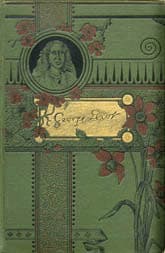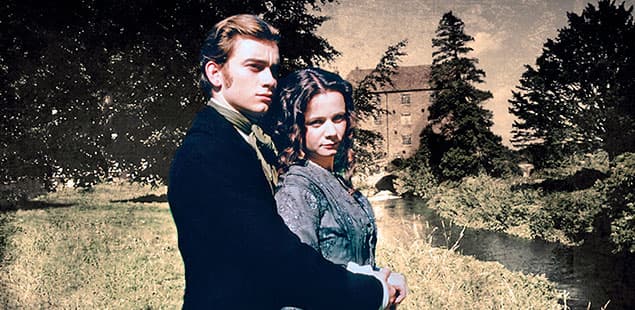The Mill on the Floss
Critique • Quotes • At the movies
 1885 edition
1885 editionFirst publication
1860
Literary form
Novel
Genres
Literary, psychological fiction
Writing language
English
Author's country
England
Length
Approx. 202,000 words

The Tullivers, Tom (Ifan Meredith) and Maggie (Emily Watson), ponder the Floss in 1997 TV film.
A mournful Mill
The Mill on the Floss (1997): Television film, 90–110 minutes; director Graham Theakston; writer Hugh Stoddart; featuring Emily Watson, Bernard Hill, Ifan Meredith, Cheryl Campbell, James Frain
George Eliot's novel has been adapted to film at least five times, but for now we are looking at only the most recent outing.
And a dreary outing it is. The 1997 version of The Mill on the Floss is one of those productions that seem to think the way to film a British literary classic is to produce a script faithful to all the main points of the novel while cutting out the entertaining bits in-between, hire a lot of English actors (though no one too popular), and shoot it in somber colours.
First, about the script: it really is impressive how the story is compressed so that all—and I mean all—the highlights are there in one form or another. This sounds like a good thing for a booklover, and it might be if we had three or four hours in a miniseries to do justice to each of the story's turns. But with only ninety to a hundred and ten minutes for this movie (depending on where you see it), we have to keep skipping ahead from point to point without any of it really sinking in. Characters are inexplicably nasty or stubborn or led into temptation, without the viewer understanding what made them that way.
Exceptions to this skipping pace are lingering impressionistic underwater shots and long dreamy shots of Maggie drifting down the river past all the people she's ever known, scenes unaccountably scattered throughout the movie. Director Graham Theakton, who otherwise has worked almost entirely in television, never does connect these sequences up with anything, perhaps thinking they're some kind of artsy foreshadowing of the tragic end to come.
Trailer for BBC's 1997 adaptation of The Mill on the Floss.
The acting is decent, the most recognizable faces being Emily Watson in one of her first roles as grownup Maggie and Bernard Hill (best know perhaps as the captain in Titanic) portraying Mr. Tulliver. In this film though he's somewhat nastier than the hapless fellow of the novel. And all the characters are so serious, so ponderous. Daily life is apparently such a burden in eighteenth-century England. It doesn't help that the liveliest character in the novel, Tom's rough friend, Bob, is one of the few dropped from the film.
And that tragic ending, when it comes all too soon, is a bit of an anticlimax. Compared to how it unfolds in the novel, the scene is over too suddenly.
Also, a crucial detail for the melodramatic telling of the story is changed at the end. I won't give away exactly what it is, so as not to spoil it for those who haven't read the book, but it has to do with embracing.
Sure, the original story is ultimately tragic and it is often dark, but it also has love, compassion and wry humour in Eliot's telling of it—that is to say, it has some life. This movie is all so admirable in intent and yet so dead.
— Eric

